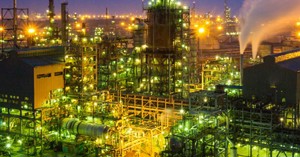Indian refiners turn to use dirty fuel to produce power, gas
NEW DELHI/MUMBAI (Reuters) — Indian oil refiners are drawing up plans to use petroleum coke for power generation and to produce syngas after the government banned use of the heavily polluting fuel in and around New Delhi.
The country's top refiner Indian Oil Corp (IOC) and other refiners have invested billions of dollars in recent years to install delayed coker units to produce high-value added products such as gasoline and liquefied petroleum gas.
The units produce petcoke as a byproduct, equivalent to 25%–30% of a unit's capacity, which refiners sell to local industries. But after the Supreme Court imposed a ban on petcoke in New Delhi and three surrounding states from last month to fight pollution, refiners are having to rethink what they do with the fuel.
IOC supplied petcoke from some of its plants, mainly in northern India, to industries in Haryana, Rajasthan and Uttar Pradesh—the states where it is now banned. It is still producing petcoke but diverting it to regions where it is not banned, its chairman Sanjiv Singh said on Tuesday.
The oil ministry has also asked state refiners to consider setting up petcoke gasifiers, a government source said.
IOC is evaluating building a 2 MMtpy petcoke gasifier costing $2.3 B–$3.1 B at its 300,000-bpd Paradip refinery in eastern India, its chairman said.
Gas made from petcoke can be used internally in refineries and at petrochemical plants.
"Normally petcoke gasifiers are large and capital intensive. A possibility is that we can build one gasifier for two to three refineries," Singh said. IOC operates 11 refineries in India.
Reliance Industries, owner of the world's biggest oil refining complex, has set up petcoke gasifiers to produce gas for internal needs using 6.5 MMtpy petcoke produced at its two refineries.
CURBING EMISSIONS
Annual demand in India for petcoke, which emits harmful sulfur oxides and carbon dioxide when burned, has doubled to 27 MMt in the past 4 yr as it is cheaper and more energy efficient than coal.
Bharat Petroleum Corp uses petcoke produced at its 120,000 bpd Bina refinery in central India to generate power, its head of refineries, R. Ramachandran, said.
HPCL-Mittal Energy (HMEL) is converting a captive power plant at its 180,000 bpd Bathinda refinery to use petcoke. "We have installed various units including scrubber (units) to curb emissions," a company official said.
HMEL's chief executive declined to comment.
Oil company officials hope that the Supreme Court will allow the use of petcoke in the cement industry, where it is not used as a fuel. India's environment ministry also favors an exemption for the cement industry from the ban.
Hindustan Petroleum Corp will use petcoke produced at its planned 180,000-bpd Rajasthan refinery for power generation, its chairman M. K. Surana said.
Its Vizag refinery in southern India, which it is expanding, produces no petcoke at all.
"Now we are going for a technology where there is no petcoke production, basically the bottom residue gets converted into liquid," Surana said.
Reporting by Nidhi Verma and Promit Mukherjee; Editing by Susan Fenton







Comments